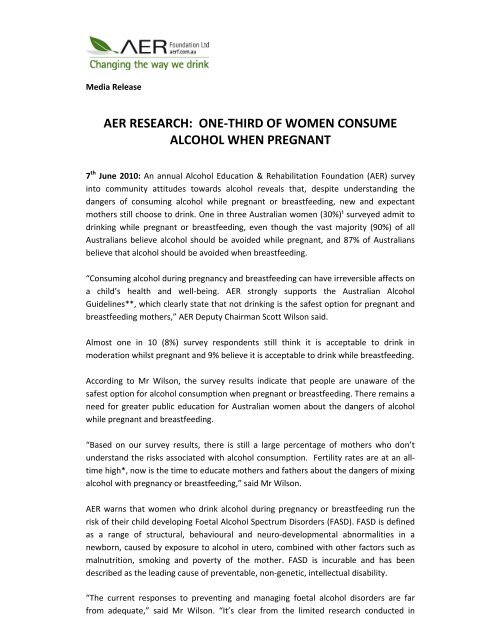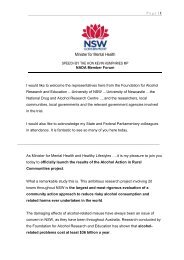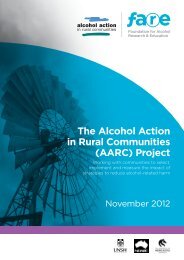aer research: one-third of women consume alcohol when ... - FARE
aer research: one-third of women consume alcohol when ... - FARE
aer research: one-third of women consume alcohol when ... - FARE
You also want an ePaper? Increase the reach of your titles
YUMPU automatically turns print PDFs into web optimized ePapers that Google loves.
Media ReleaseAER RESEARCH: ONE‐THIRD OF WOMEN CONSUMEALCOHOL WHEN PREGNANT7 th June 2010: An annual Alcohol Education & Rehabilitation Foundation (AER) surveyinto community attitudes towards <strong>alcohol</strong> reveals that, despite understanding thedangers <strong>of</strong> consuming <strong>alcohol</strong> while pregnant or breastfeeding, new and expectantmothers still choose to drink. One in three Australian <strong>women</strong> (30%)¹ surveyed admit todrinking while pregnant or breastfeeding, even though the vast majority (90%) <strong>of</strong> allAustralians believe <strong>alcohol</strong> should be avoided while pregnant, and 87% <strong>of</strong> Australiansbelieve that <strong>alcohol</strong> should be avoided <strong>when</strong> breastfeeding.“Consuming <strong>alcohol</strong> during pregnancy and breastfeeding can have irreversible affects ona child’s health and well‐being. AER strongly supports the Australian AlcoholGuidelines**, which clearly state that not drinking is the safest option for pregnant andbreastfeeding mothers,” AER Deputy Chairman Scott Wilson said.Almost <strong>one</strong> in 10 (8%) survey respondents still think it is acceptable to drink inmoderation whilst pregnant and 9% believe it is acceptable to drink while breastfeeding.According to Mr Wilson, the survey results indicate that people are unaware <strong>of</strong> thesafest option for <strong>alcohol</strong> consumption <strong>when</strong> pregnant or breastfeeding. There remains aneed for greater public education for Australian <strong>women</strong> about the dangers <strong>of</strong> <strong>alcohol</strong>while pregnant and breastfeeding.“Based on our survey results, there is still a large percentage <strong>of</strong> mothers who don’tunderstand the risks associated with <strong>alcohol</strong> consumption. Fertility rates are at an alltimehigh*, now is the time to educate mothers and fathers about the dangers <strong>of</strong> mixing<strong>alcohol</strong> with pregnancy or breastfeeding,” said Mr Wilson.AER warns that <strong>women</strong> who drink <strong>alcohol</strong> during pregnancy or breastfeeding run therisk <strong>of</strong> their child developing Foetal Alcohol Spectrum Disorders (FASD). FASD is definedas a range <strong>of</strong> structural, behavioural and neuro‐developmental abnormalities in anewborn, caused by exposure to <strong>alcohol</strong> in utero, combined with other factors such asmalnutrition, smoking and poverty <strong>of</strong> the mother. FASD is incurable and has beendescribed as the leading cause <strong>of</strong> preventable, non‐genetic, intellectual disability.“The current responses to preventing and managing foetal <strong>alcohol</strong> disorders are farfrom adequate,” said Mr Wilson. “It’s clear from the limited <strong>research</strong> conducted in
Australia to date that the prevalence <strong>of</strong> FASD nationally is still widely unknown, andcertainly under‐reported.”Mr Wilson cites a number <strong>of</strong> AER‐funded programs² that have <strong>research</strong>ed FASD andother problems associated with <strong>alcohol</strong> consumption during pregnancy andbreastfeeding.“AER supports national and interstate initiatives that address <strong>women</strong>’s dependence on<strong>alcohol</strong>, and the potential dangers <strong>of</strong> drinking while pregnant.” Mr Wilson said.“FASD is most prevalent in communities where there is a lack <strong>of</strong> health, social supportand educational resources. More support is required from the Government in theseareas.”The national study conducted by Galaxy Research, is commissi<strong>one</strong>d annually by AER,Australia’s leading <strong>alcohol</strong> harm minimisation body. There were 1014 respondents aged18 years and above polled in this online survey completed in January 2010.Key facts for <strong>women</strong> who are pregnant or breastfeeding ***AER supports the NHMRC Australian Guidelines that recommend that not drinking<strong>alcohol</strong> is the safest option during both pregnancy and breastfeeding. For moreinformation see the NHMRC Australian Guidelines to Reduce Health Risks from DrinkingAlcohol or consult your GP.‐ ends –Media Contact:Amanda McGregor 02 9492 1004 mb: 0411 222 311 email: amanda@launchgroup.com.auAlcohol Education & Rehabilitation Foundation (AER): The Alcohol Education & Rehabilitation Foundation (AER) is a unique,independent, not‐for‐pr<strong>of</strong>it organisation with a goal to change the way we drink. AER collaborates with grass‐roots communityorganisations, all levels <strong>of</strong> government, police, <strong>research</strong>ers and the private sector to turn evidence‐based <strong>research</strong> on <strong>alcohol</strong> andsolvent misuse into practical, real‐life solutions. Since its inception in 2001, AER has invested over $115 million in prevention, publiceducation, workforce development, and treatment & rehabilitation projects, underpinned by innovative <strong>research</strong>. Our dedication tocreating a safer and healthier Australia sees AER forming new partnerships and alliances with like‐minded organisations, with a focuson youth and Indigenous issues. Looking forward, AER will continue its unwavering commitment to changing Australia’s drinkingculture to <strong>one</strong> <strong>of</strong> safety and responsibility. For further information: www.<strong>aer</strong>f.com.au(1) About the Galaxy Research: The Galaxy study was commissi<strong>one</strong>d by AER. The online <strong>research</strong> was conducted between 15 th to18 th January 2010. It was national survey (excluding NT) and was weighted by age, gender and location (based on ABS populati<strong>one</strong>stimates) to the national population. There were 1014 respondents aged 18 years and above.(2) AER‐supported initiatives include the following:Rio Tinto Child Health Research Partnership (Telethon Institute for Child Health Research ‐ Kulunga Research Network)The impact <strong>of</strong> <strong>alcohol</strong>‐related disorders on drivers’ license restriction, suspension, loss: A longitudinal study (The University<strong>of</strong> Queensland ‐ Pr<strong>of</strong> Gail Williams)Increased domestic violence an unexpected consequence <strong>of</strong> new liquor licenses: New licensing model can predict impact on<strong>alcohol</strong>‐related violence (National Drug Research Institute) Examine the "Influence <strong>of</strong> <strong>alcohol</strong> consumption on breastfeeding initiation and duration in Australia" (Curtin University ‐Colin Binns)Cyrenian House Out‐Patient Services (WA Council on Addictions)
A participatory action program to promote capacity building for <strong>women</strong> who have been sexually abused and who abuse<strong>alcohol</strong> (RDNS Research Unit)Stability and change in <strong>women</strong>'s <strong>alcohol</strong> consumption: Factors related to <strong>alcohol</strong> consumption in <strong>women</strong> from the Women'sHealth Australia study (Turning Point Alcohol and Drug Centre ‐ Sharon Matthews and Susan Clemens)The GROG Program (Newman's Women Shelter)More information about these studies and programs is available upon request*Source: Australian Bureau <strong>of</strong> Statisticshttp://www.abs.gov.au/ausstats/abs@.nsf/Latestproducts/3301.0Media%20Release12008?opendocument&tabname=Summary&prodno=3301.0&issue=2008&num=&view=**Source: NHMRC Guidelineshttp://www.nhmrc.gov.au/_files_nhmrc/file/publications/synopses/ds10‐<strong>alcohol</strong>.pdfThe 2009 Australian Guidelines to Reduce the Risks from Drinking Alcohol published by the NationalHealth and Medical Research Council (NHMRC) advise that not drinking is the safest option for <strong>women</strong>who are pregnant or planning a pregnancy. Not drinking <strong>alcohol</strong> while breastfeeding is also recommendedby the guidelines.***Source: Australian Breastfeeding Associationhttp://www.breastfeeding.asn.au/bfinfo/ABA_Alchohol_BF.pdf






